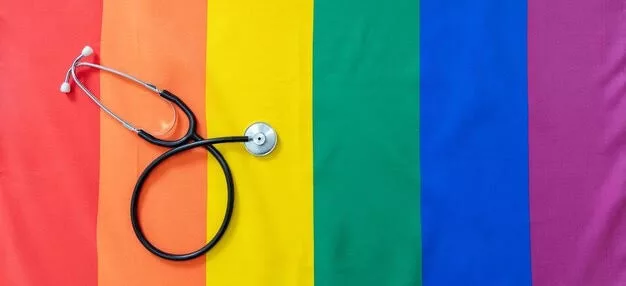Gays at Work: Alex, Junior Doctor
One of my favourite factoids-cum-urban legends happened in 70s Sweden. In 1979, homosexuality was classed as a mental illness. While staging an occupation of the National Board of Health and Welfare, members of RFSL – the Swedish Federation for Lesbian, Gay, Bisexual and Transgender Rights – called in sick. Instead of faking a cough like the rest of us, they called in ‘gay’ to work.
As funny as that story might be, it is illustrative of the historically tense relationship between the LGBTQ+ community and medicine. Only in 2021 did regulations change allowing more queer men to donate blood. With this in mind, I wanted to know what it’s like to be a gay doctor. I spoke to junior doctor Alex about his experiences.
“I’m aware of broader LGBTQ+ discrimination in the UK, but I haven’t felt any of this in the NHS.” So far, so good. “I’ve never been the target of any overt homophobia, nor have I known anyone complain about it. You hear about it, but I’m yet to see it.”
If he’d never been the object of nor seen this rumoured homophobia, I had to ask Alex if he was ‘out’ at work.
“Currently, I’m working with a doctor in intensive care. During our first meeting, he asked if I had a wife or girlfriend. I said that I wasn’t looking for a partner as I’m going away for the summer. I never corrected him. I didn’t even occur to me till after. There’s no trepidation per se, but I don’t think I would actively correct someone.”
You say no trepidation, I said, but surely not correcting your colleague says otherwise.
“I don’t know about this doctor personally; he seems a great guy, but outing myself could’ve been an unnecessary complication, especially with someone I’m starting a professional relationship with for six months. I don’t think it would’ve caused problems. But it might have changed things.”

While Alex couldn’t be sure of his colleague’s opinion, after an incident via social media, he had a better understanding of others’.
“About six months ago, a number of doctors in my trust posted an anti-LGBTQ+ image on Facebook. It featured a nuclear heterosexual family under an umbrella, protecting them from the rainbow-coloured LGBTQ+ rainfall.
“Around 80% of the doctors in my trust come from more conservative countries where these views are the norm. These views are being imported.”
Despite this display of homophobia, Alex believes this doesn’t have any influence on patient care. Rather than affecting his ability to do his job, Alex agreed that it impacts the environment.
“Would I be treated differently if people knew I was gay, decided they didn’t like me because of it? Maybe but I don’t know. I manage to not care too much about people’s opinions of me.
“If I was to talk to a friend about a date and there was someone homophobic in the corner, I wouldn’t care. In other situations, the environment can make a difference to what I’m willing to share. The other day, we were chatting about marriage; I would’ve more likely disclosed my views in a different setting.”
But – to paraphrase Alex – the homophobia of his colleagues does not play a role in how he does his job, or how his colleagues do theirs. “Despite personal beliefs, the doctors I’ve worked with follow standards of patient care before their own beliefs.” An example: a haemorrhaging womb is a haemorrhaging womb, no matter how the person identifies or the pronouns they use. A doctor’s role is to stop that haemorrhaging.
As for patients, Alex doesn’t volunteer personal information: “to be honest, I wouldn’t discuss anything much deeper than the weather. In intensive care, my relationships with patients are pretty short.”
As well as talking about being a gay doctor, I wanted to delve into the relationship between the LGBTQ+ community and the medical field. Although his sexuality doesn’t affect his job, a patient’s sexuality might affect their experience. Was there training about supporting queer patients?
“As far I’m aware, there isn’t, but that’s not to say it doesn’t exist. Unless it’s for something like a STI, a patient’s sexuality is often beside the point. You have to think of the benefits to patients locally and nationally. Locally, I’ve never seen any lack of patient care based on sexuality. Nationally, I know there are biases, especially towards trans people.”
How can this be addressed? “Training would suggest that we need to change individual doctors, and I’m not sure if patients are suffering for lack of care. Might be more of an institutional issue.”
Coming up with a solution to weed-out institutional anti-LGBTQ+ discrimination in the NHS is a big ask. It’s not the case of focusing on one hospital, one medical field or one doctor, but about changing the culture.
“Changing these views would require a level of cultural integration that might not be possible. A lot of these ideas are based on people’s cultural norms and I don’t think you can necessarily train a cultural view into someone.
“Could a two-hour lecture on trans rights and health make a difference? Maybe – for junior doctors, this could be embedded into their training, to encourage discussion. The majority of hospitals have weekly or monthly discussions. An hour presentation on how sexuality relates to healthcare and needs could be impactful. But in terms of far-reaching strategies, I don’t know.”
However, Alex made a point that I hadn’t thought about. That the role of the NHS isn’t to fight discrimination, but to save people’s lives.
“The NHS has more pressing needs than creating a £2mil LGBTQ+ teaching scheme. This money would be better spent on equipment. We have to prioritise energy and money and focus. The NHS is not an institution built to combat homophobia. It can strive to fight it, and there’s certainly a mental health aspect to it. But when I have an intensive care patient waiting on an ambulance for hours, that’s where I want the resources to go.”
I understood Alex’s comment. Burdens placed on the NHS are not news and decisions have to be made about funding and resources. Five doctors offering top-rate medical care, but are homophobic, might be more beneficial than one accepting doctor.
One of my final questions for Alex was about certain medical practices that stem from out-dated opinions. We talked about previous blood donation regulations and fertility treatment policies – both practices that can discriminate against queer people.
“In terms of blood donation, this is the most well-known example. There were reasons for this policy to be implemented, but it was discriminatory and not well evidenced-based.
“I’m not a huge fan of the NHS funding fertility treatment in general, but I suppose it is indirectly discriminatory. There are more critical areas that require greater resources. However, if this policy continues, this should be fixed.”
As Alex said, the NHS is catching up, areas such as sexual health have advanced in the last 20 years. What could the next 20 bring? For professionals, he says that the NHS is responsive to discrimination. We might have to wait for the cultural integration Alex spoke of, but looks like the future of medicine for queer people and doctors is promising.

